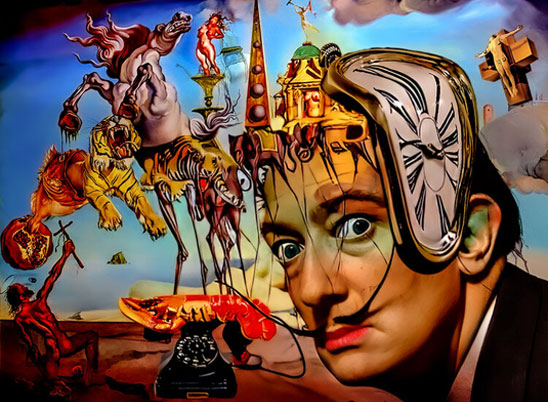
11/05/1904 – 23/01/1989
Salvador Dalí, born in 1904 in Figueres, Spain, and passed away in 1989 in the same city, was a world-renowned painter, sculptor, writer, and filmmaker. He is famous for his surrealist style and his fantastic, dreamlike works. Dalí quickly established himself as an iconic figure in 20th-century art thanks to his boundless imagination and technical skill.
He began his artistic training at the Royal Academy of Fine Arts of San Fernando in Madrid, where he quickly distinguished himself with his talent and eccentricity. Influenced by Cubism and Dadaism, Dalí found his true artistic voice by joining the Surrealist movement in the 1920s. He was strongly influenced by Sigmund Freud’s theories on the unconscious, which he incorporated into his works.
Dalí is best known for his surrealist paintings, such as “The Persistence of Memory” (1931), with its famous melting clocks, and “The Dream of Venus.” His works are characterized by dreamlike landscapes, metamorphosed objects, and technical precision reminiscent of Renaissance masters. His paintings invite the viewer to explore the depths of the unconscious and question reality.
In addition to his paintings, Dalí also worked in many other media, including sculpture, photography, film, and fashion. He collaborated with filmmakers like Luis Buñuel, notably on the film “Un Chien Andalou” (1929), a surrealist short film that left an indelible mark on the history of cinema. His sculptures, such as “The Profile of Time,” extend the surrealist themes of his paintings.
Dalí was also known for his eccentric personality and theatrical public behavior. He cultivated a provocative image, often wearing extravagant clothing and sporting his famous handlebar mustache. His flair for spectacle and skillful use of the media made him a global celebrity.
